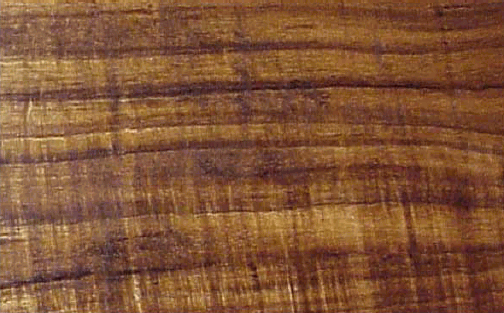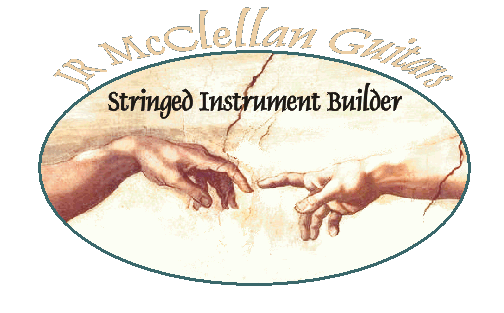Please use the menus above to learn about the various components and methods I use in building stringed instruments.
I am a custom stringed instrument builder or
luthier.
I have, to date, primarily built guitars, but the principles of making music by means of a
vibrating string activating a plate apply to many well-known instruments
including guitars, mandolins, dulcimers, banjos, violins, harpsicords and
pianos. Each specific instrument has its own structural and
acoustic issues which must be addressed by the builder. I am
continually learning about these issues, and about the ways in which they have
been traditionally addressed. I doubt that process will ever end. At
the same time, I use my own understanding of mechanics, and my own perceptions
of acoustics to bring about a result which satisfies my customers.
Although the basic instrument designs follow traditional
lines regarding shape and size, my instruments are personally designed by
myself. I use CAD solid model designs as the basis for all my
guitars. I have created all templates and jigs based on these
models. I do a free-standing build, without the use of form molds to
constrain the guitar into it's shape. This means I must bend the sides and
allow them to 'rest', then touch them up prior to assembling. I believe
this allows for the most natural vibration of the entire instrument, with the
least energy being lost to internal stresses. I use mostly traditional
methods, but where time can be saved without sacrificing the soul of the
instrument, I use more technically current methods. For example, I use a
machine to sand a plate close to its final thickness, but I complete the job
only by means of hand working and tapping the plate to determine its final
form. I don't even measure when it gets to this point. It is a feel
for the specific pieces of wood, and a very personal sense of what sound that wood is
capable of accomplishing which leads to a final product. This is true for
the sides and back also. I do a final voicing of the instrument only after
it has been finished, setup and played for several hours.
Finishing is a
very time-consuming and meticulous process. I use nitrocellulous lacquer,
unless time constraints and weather would delay delivery of the
instrument. Nitro lacquer can only be sprayed successfully under certain
atmospheric conditions, and in S. WI, we can have extended periods where spraying
is impossible. Should that occur, I give the customer the option of having
KTM-9 water-born lacquer on the body only. The KTM-9 product is virtually indistinguishable from the nitrocellulous
lacquer in result. It ages well and doesn't seem to suffer from the malady
of its earlier versions - degradation from sweat. Nevertheless, I don't put KTM-9 on necks. Necks
are all finished in nitrocellulous lacquer and the shaft of the neck is buffed to
a satin finish for easy hand movement.
I create all
artwork personally, usually from customer supplied examples or
descriptions. I use a computer graphics software package to manipulate
manual drawings and create templates as needed to transfer the art accurately to
the wood which will receive the inlay art. I cut all the inlays and
pocketwork with rotary milling tools (Dremel, Foredom) by hand. Although
my background is in complex CNC
machining (see Who Am I?), I find I get much satisfaction by
actually doing the work by hand. The tiny imperfections which may result,
although not noticable to the observer, give the artwork a unique personality
which can't be achieved by the digital perfection of CNC. It also helps me
to connect completely to the overall intention of the craft. My customers
find this 'organic' approach has great appeal. I don't mean to say
that I will never integrate any CNC work into an instrument I build, but until I
am convinced that such processes will enhance my ability to personally couple
with the instrument and understand what it needs to make it what my customer
requires, I'll resist using it. Many small builders have moved in that
direction, but I believe that it is for reasons of production and profit more
than for reasons of improving the heart and soul of the instrument.
I
also subscribe to the belief that all things have a spiritual component, and I
very much see music in this way. I work hard to bring such a component into the musical instruments
I build, yielding myself to the Creator of all things. I believe
He can and does give me insights into how to work the
wood to achieve its ultimate potential, for the good of my customer. As
stated elsewhere on this site, I'm primarily a disciple of Jesus Christ, and
I build stringed instruments because He led me to understand that
I should. Although it may sound strange to many, I trust Him to help me all along the process of building. My understanding is
always limited, to some degree, with respect to the possibilities I'm presented with. His never
is. For that reason I also am ready to tell you that I
build these instruments to glorify Him, and it is my sincere prayer that anyone
who owns one will one day play
their music to glorify Him also. It's just the truth.
![header=[J. Rod McClellan] body=[This is me - playing guitar at a friend's house. Sorry about the 5 o'clock shadow]](images/Photos/people/rod1.jpg)


![header=[Interesting Info] body=[These are my initials - JRMc]](images/initials.gif)
